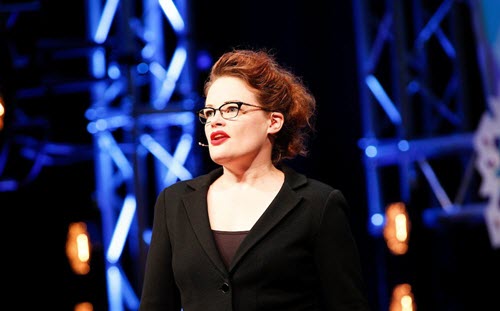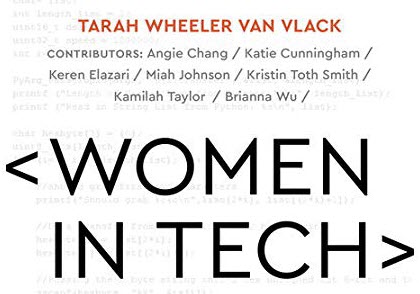I started reading Invisible Women by Caroline Criado Perez and it made me feel so insecure and anxious that I had to put it away for a while. It’s a testament to how important that book is but I still need to function, so I’ll read that in bits and pieces.
To counter the negativity I needed something upbeat, but as the feminist theme was still resonating strongly I chose a book by Tarah Wheeler on Women in Tech. I’ve been following Tarah on Twitter for a while and I think she is incredibly cool. I can try to explain here, but I won’t be able to do her justice, so just check out her feed yourself.
The book was a good choice. It’s not just positive stories (it can’t be when talking about women in tech), but it’s hopeful and kind. And as I’ve been a woman in tech for the last 20 years there are no earth-shattering surprises in the book to throw me off balance.
Writing this post was hard though. There are so many things in this book that I can relate to and that I would have liked to share a story about that I could have written a book about the book. I have tried not to, but this post still ended up being quite long.
The book is written as a chronological career in tech. It starts by talking about applying for jobs in the tech industry, covers some specifics about several different types of jobs that you can have in the industry, talks about your brand, about mentoring and being mentored and finally about moving into a leadership position in a tech company or even starting your own company.
The book starts with the shocking revelation that since I was born, the percentage of women working in computer science and achieving computer science degrees has decreased. This means that despite tech companies desperately looking for women to diversify their teams most women are still choosing a different career path. The reasons for this are numerous and a lot of them are hard to resolve.
One of the reasons is the unconscious bias of teachers, parents and eventually inevitably of girls themselves that math, physics, and technology are for boys. It’s in the wording and images that we use and in the way that we think about stereotypes for people in these fields.
Another important challenge is the lack of role models. I was lucky because my mum was a computer programmer. This was never discussed as being remarkable at home which means that for me the image of a woman working as a technologist was normal and natural. Most girls don’t have role models like that though and on TV and in books these roles are often still played by boys with floppy hair and glasses.
People also often feel like you need to be “special” to be able to succeed as a software developer or as a systems engineer or a security expert (or hacker). When I was still a developer myself people would often comment that “I must be really smart then”. You don’t need a special brain to be able to be successful in technology. If you are willing to work hard and you like puzzles (and I know a lot of women and girls who like puzzles) you are already half of the way there.
Tarah and her co-authors are very open about their successes as well as their failures in the book.
One of the lessons that she learned when moving into leadership roles is that you need to shift your approach. As a woman in tech, you’ll be spending quite some time making sure people see that you are good at what you do, that you belong. You’ll have to be more vocal about your achievements than what comes naturally to most women. As you move into a leadership role you need to adjust this. You shouldn’t be out to prove that you are the smartest person in the room. Instead, you should attempt to create an environment in which your team feels that they are smart and capable to allow them to do their best work. In this, she touches on one of my favorite topics of this moment; using the full capability of your teams by being a multiplier of their energy and intelligence. (For more information check out Multipliers by Liz Wiseman.)
The story of Kamilah Taylor, one of the co-authors, also resonated with me. Kamilah is a software engineer at Linked-In (at least at the time of writing the book) and has an MS in computer science and robotics.
She talks about the pressure of representing a minority (in her case 3 minorities) in a field. As you move up the ladder in your career people will inevitably start to look up to you. This is a great feeling and very reaffirming, but it also ups the stakes. It starts to feel like if you fail, you don’t just fail for you. It feels like you are letting down all the other women in your company or even in tech. Making a mistake or things not working out as you wanted gets a lot of extra weight.
This can work as a powerful motivator, but it also adds more stress that you need to cope with.
I feel this too. Occasionally I strive for things because I feel it will set a good example, rather than because it’s something that I genuinely care about.
The stories in Women in Tech are valuable and easy to relate to and the book is a very enjoyable read. What amazed me is the invitation that Tarah extends several times in the book to reach out to her personally for advice or help. It’s inviting and powerful. I’d be scared to do this as in my experience of writing a relatively successful tech blog, sharing your ideas makes people feel entitled to a lot of your time and energy anyway. On the other hand, as a lot of them will feel entitled you might as well invite the people who’d otherwise not feel comfortable enough to reach out.
The main thing that I took away from the book other than the pleasure of reading it, is to be even more aware of my unconscious biases. Being open-minded, thinking critically and constantly examining your own ideas and assumptions is what will allow us to grow as a people and even as a species. Find both the similarities and the differences between you and everyone else and use empathy to relate and connect.



I really loved this post! I like how it blends the ideas in the book with real-life experience. It really gave me a clearer picture of what the book is about but also what the world of tech is like in the experience of women.
LikeLiked by 1 person
Thank you! You’re making me blush 😉
LikeLiked by 1 person
Pingback: Looking back | Kalliope's Journey
I am always in awe of how you do a review and even if the book is not something I might consider reading, after I read how you experienced the book, I feel like that is a book I really want to read!
Amazing! 🙂
LikeLiked by 1 person
You are so kind, Margie!
Thank you so much.
❤️
LikeLiked by 1 person
You are most welcome, Mirjam. ❤
LikeLiked by 1 person